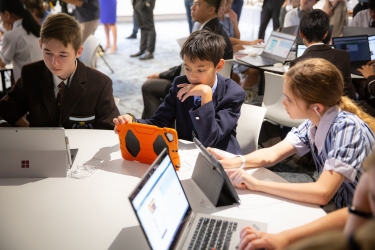Grok says over 25,000 active Australian students from 1200 schools competed in last year’s NCSS Challenge, which was up from 16,171 in 2022 - and these numbers make the NCSS Challenge one of the largest coding events in the country.
According to Grok, almost three quarters of students who did the NCSS Challenge last year reported being “more confident about programming” and said they learnt a significant amount about programming - which is a top-rated future job skill. 70 percent of students also said they enjoyed the challenge, demonstrating an important balance between learning and fun.
“Grok Academy has worked closely with industry partners to design challenges closely aligned with real-world problems from medicine to movies, sport to science, and everything in between, explained Jane Abrams, Grok Academy’s Chief Product Officer.
|
|
“The NCSS Challenge is specifically designed to engage young people in technology and STEM-focused problem solving, while also giving teachers an excellent classroom-ready resource aligned to the Digital Technologies curriculum (Australia and New Zealand).
“It’s an immersive and interactive experience where students have fun, learning as they go, and competing to climb the leaderboard against peers from across Australia and Aotearoa New Zealand,” Abrams said.
Abrams notes that students receive online support from Grok Academy tutors, as well as experts actively working in tech-related roles within sponsor organisations like Atlassian, Australian Signals Directorate, Commonwealth Bank, Macquarie, National Australia Bank (NAB), Optiver, Telstra, Westpac, and platinum sponsor, WiseTech Global.
“Having our industry experts on-hand takes the pressure off classroom teachers. They have confidence knowing their students are applying different technical skills from the curriculum, with personal access to ‘real-life’ engineers, scientists and programmers to answer questions and guide them along,” Abrams said.
“Teachers consistently praise the NCSS Challenge and sign their classes up year after year. One teacher described the Challenge as ‘one of the best and most rewarding extra-curricular activities available for students who love programming and want to grow their skills and knowledge in that area.”
Grok notes that NCSS Challenge participants are also supported with intelligent auto-marking and instant feedback. “Teachers get a live dashboard showing their students’ progress against others from both countries. If teachers wish to utilise the material at a pace that suits their class, content can be made available throughout the year without the leaderboard aspect and tutor support.”
Of those who participated in the NCSS Challenge last year, Grok explained that 73 per cent said they felt more confident about programming, and students agreed the top three aspects of the competition were learning to code (70%), that it was fun (65%), and being supported with step-by-step instructions (48%).
2023 NCSS Challenge participant, 17-year-old student Lauren, says the online programming competition teaches you as you go: “You are able to test yourself, but you aren’t expected to already know everything. I love how the problems are so creative and entertaining to read. The tutors are also really friendly and respond quickly to queries.”
Grok said the NCSS Challenge is one of its many initiatives that support its goal to empower Australian and Aotearoa New Zealand students with the technology skills they need to thrive in the digital economy. The program runs twice a year in February and July. For more information visit theNCSS Challenge web page.












































